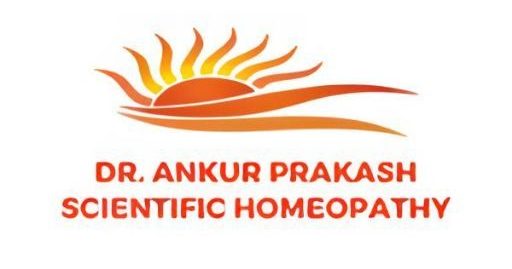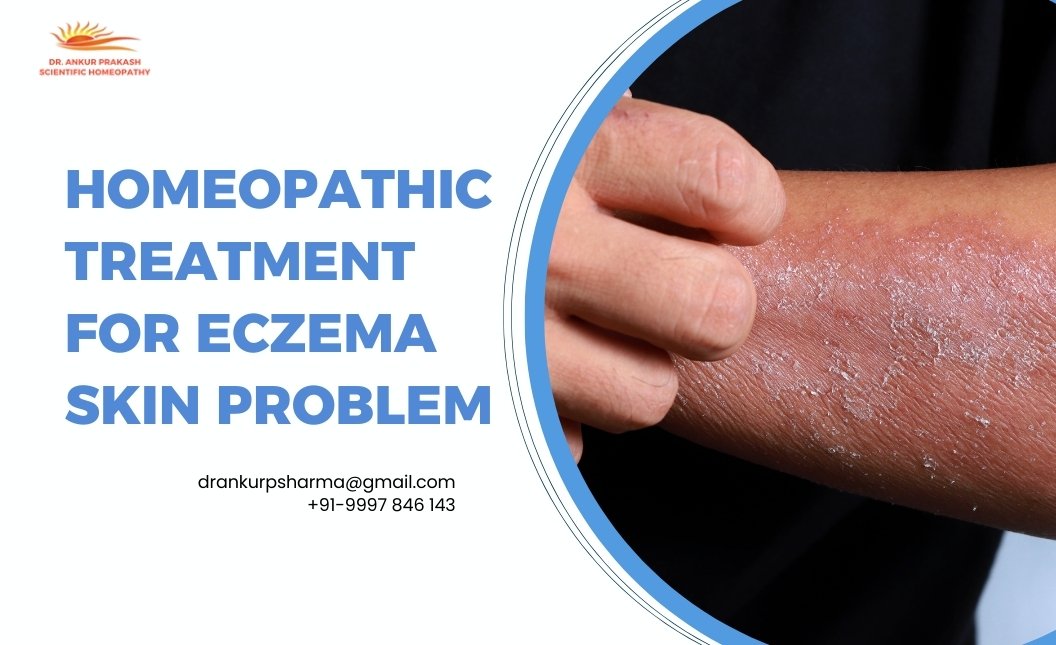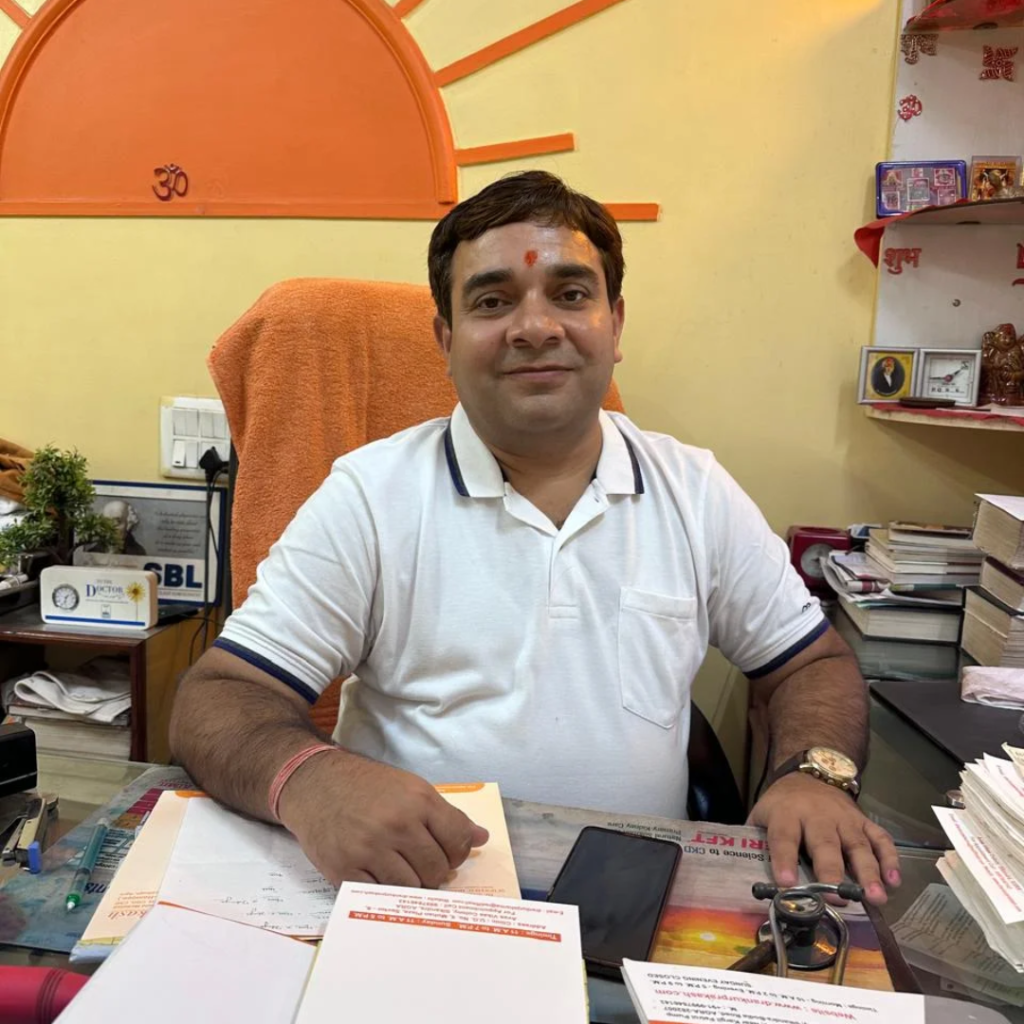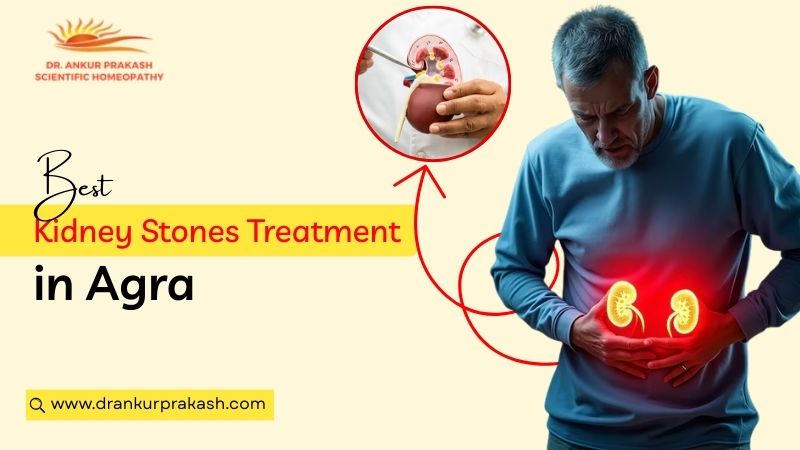Homeopathic Treatment of Eczema Skin Problem
Discover effective Eczema Treatment in Homeopathy with renowned Dr. Ankur Prakash. Explore natural, holistic solutions tailored for lasting relief from eczema Skin Problems. Eczema, a chronic skin condition characterized by itchy, inflamed skin, can be distressing and uncomfortable. However, Homeopathy offers a promising solution for those seeking a natural and holistic approach to skin health. The ‘Eczema Treatment in Homeopathy‘ emphasizes the use of natural substances to stimulate the body’s self-healing process. This approach not only aims to alleviate the symptoms of eczema but also addresses the underlying causes, providing long-term relief.
Homeopathy for eczema focuses on the individual’s unique symptoms and overall health. By considering the physical, emotional, and genetic factors, homeopathic treatments are tailored to each person, ensuring a more personalized and effective treatment plan. Unlike conventional treatments, which often rely on topical steroids or antihistamines, homeopathy offers a non-invasive and side-effect-free alternative.
In this blog, we delve deeper into the ‘Types of Eczema’ and explore the ‘Causes of Eczema.’ Understanding these aspects is crucial for effective treatment. We also guide you on ‘How to Diagnose an Eczema?’ This is essential to ensure that the homeopathic treatment is accurately targeted to your specific condition. Through our comprehensive approach, we aim to enhance your understanding of eczema and how homeopathy can be a viable option for managing this skin condition.
Types of Eczema Skin Problem
Eczema, a common skin condition, manifests in various forms, each with its unique characteristics and triggers. Comprehending the various categories is crucial for efficient management and therapy.
Atopic Dermatitis: This is the most prevalent form, often starting in childhood. It’s characterized by dry, itchy patches, usually on the elbows, behind the knees, and on the face. It often occurs in people with a family history of allergies or asthma.
Contact Dermatitis: This occurs when the skin reacts to a substance it has come into contact with, leading to red, itchy rashes. Common irritants include detergents, soaps, or certain metals.
Dyshidrotic Dermatitis: This type affects the hands and feet, presenting as small blisters. It’s more common in women and may be triggered by stress or seasonal allergies.
Nummular Dermatitis: Also known as discoid eczema, this form appears as round, coin-shaped spots on the skin. These spots can be itchy and scaly, often found on the legs, torso, arms, and hands.
Seborrheic Dermatitis: This type affects areas of the body with a high concentration of oil-producing glands. It’s marked by red, scaly patches, and is common on the scalp, face, and chest.
Stasis Dermatitis: This form usually occurs on the lower legs and is often related to circulatory problems. Symptoms include swelling, itching, and redness in the affected areas.
Symptoms of Eczema:
Identifying the signs of this prevalent skin issue is key to timely and effective management. Here’s a step-by-step guide to recognizing its common symptoms:
Dry Skin: One of the earliest signs often includes unusually dry, scaly skin that may feel tight and brittle.
Itchiness: A persistent itchiness is a hallmark symptom, which often becomes more intense during the night.
Red to Brownish-Gray Patches: These patches commonly appear on the hands, feet, ankles, wrists, neck, upper chest, eyelids, inside the bend of the elbows and knees, and in infants, the face and scalp.
Small, Raised Bumps: These bumps may leak fluid and crust over when scratched.
Thickened, Cracked, or Scaly Skin: Over time, chronic scratching can lead to thickened, cracked, and scaly skin.
Raw, Sensitive, Swollen Skin from Scratching: Continuous scratching can cause the skin to become raw, sensitive, and swollen.
Causes of Eczema
Understanding the root causes of this common skin condition is crucial for effective management and treatment. Here’s a step-by-step exploration of the key factors contributing to its development:
Genetic Factors: A family history of eczema or other allergic conditions like hay fever and asthma can increase the likelihood of developing it.
Environmental Triggers: Certain environmental elements, such as pollen, pet dander, or dust mites, can trigger a reaction in sensitive individuals.
Skin Barrier Dysfunction: In some cases, the skin’s ability to retain moisture and protect against bacteria, irritants, and allergens is compromised, leading to dryness and vulnerability to irritants.
Immune System Response: An overactive immune system can respond aggressively to harmless substances, causing inflammation and the characteristic itchy rash.
Stress: Emotional stress doesn’t cause this skin issue directly but can exacerbate the symptoms and trigger flare-ups.
Irritants in Everyday Products: Common products like soaps, detergents, shampoos, disinfectants, and juices from fresh fruits, meats, or vegetables can irritate sensitive skin.
Climate and Weather: Extreme temperatures, whether hot or cold, along with high or low humidity, can trigger or worsen symptoms.
Hormonal Changes: Fluctuations in hormones, particularly during pregnancy and certain phases of the menstrual cycle, can impact the severity and occurrence of flare-ups.
How to Diagnose an Eczema?
Diagnosing this skin condition, particularly with a focus on Eczema Treatment in Homeopathy, requires a holistic approach. In homeopathy, the diagnosis goes beyond just identifying symptoms; it involves understanding the patient’s overall health, lifestyle, and emotional well-being. Here’s a brief guide:
Detailed Medical History: The first step involves a comprehensive discussion about the patient’s medical history, including any family history of allergies or similar skin issues.
Physical Examination: A physical examination of the affected skin areas is crucial. Homeopaths look for characteristic signs like dryness, red patches, or blisters.
Symptom Analysis: Understanding the specifics of the symptoms, such as their triggers, timing, and factors that provide relief, is vital. This includes analyzing the itch intensity, the presence of any oozing or crusting, and how these symptoms affect the patient’s daily life.
Lifestyle and Emotional Assessment: Factors such as stress levels, dietary habits, and environmental exposures are considered. Emotional well-being plays a significant role in homeopathic diagnosis and treatment planning.
Homeopathic Repertorization: This involves matching the patient’s symptom profile with the most appropriate homeopathic remedy. It’s a nuanced process that requires expertise in homeopathic principles.
Customized Treatment Plan: Based on these assessments, a personalized homeopathic treatment plan is formulated. This may include specific remedies known to be effective for skin inflammation and irritation, as well as advice on lifestyle and dietary modifications.
Best Skin Specialist Doctor in Agra
Dr. Ankur Prakash stands out as the best skin specialist doctor in Agra, renowned for his expertise in treating various skin diseases with a homeopathic approach. His clinic is a beacon of hope for patients seeking Eczema Treatment in Homeopathy, offering personalized care that targets not just the symptoms but the underlying causes of skin conditions.
Understanding the complexities of skin ailments, Dr. Prakash specializes in the homeopathic treatment for skin fungal infections, an area where many patients desire non-invasive and holistic remedies. His treatments are well-regarded for their efficacy, especially in managing chronic conditions like eczema, where his approach aims to deliver long-lasting relief and prevent recurrence.
Dr. Prakash’s practice is based on the principle that every individual requires a unique treatment plan. This personalized attention has led to successful outcomes for numerous patients, particularly children and adults struggling with the discomfort and cosmetic concerns of eczema and other skin diseases.
By choosing Dr. Ankur Prakash for your skin care needs, you are not just getting a doctor but a partner in your journey to better skin health. His homeopathic treatments are designed to work with your body’s natural defenses, promoting healing from within for a clearer, healthier complexion.
FAQs
How Long Does Homeopathy Take to Cure Eczema?
The duration of homeopathic treatment for eczema varies by individual, depending on the severity and chronicity of the condition. It may take several weeks to months for significant improvement, as homeopathy aims to treat the root cause and restore balance holistically. Regular follow-up with a professional homeopath is essential for the best outcome.
Can Homeopathic Medicines Treat Childhood Eczema?
Yes, homeopathic medicines can be used to treat childhood eczema. Homeopathy considers the individual symptoms and constitution of the child to tailor a treatment that aims to reduce inflammation and discomfort, potentially leading to long-term relief. It’s important to consult with a qualified homeopath for a personalized approach.








